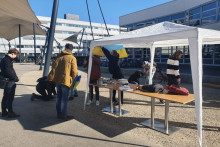When the war started in Ukraine in 2022, the foreigners present there also fled. These ‘third-country nationals’ can return safely to their countries of origins, State Secretary for Asylum and Migration Eric van der Burg decided last year. Last week, the Council of State agreed with him.
This means that as of 4 March, a lot of third-country nationals won’t be able to complete their studies in the Netherlands. They won’t only lose the right to accommodation, living allowance and healthcare, but also the right to work and study here.
Making ends meet
Only if they apply for asylum or a student visa will they be allowed to stay in the Netherlands. It’s not easy to get such a visa. An educational institution must apply for this on behalf of the student. Also, the student has to prove they can make ends meet on their own (the income requirement is around 1,200 euros per month) and pay the institutional tuition fees (between eight and sixteen thousand euros per year).
How many third-country nationals are studying in the Netherlands is unclear. Last Wednesday, State Secretary Van der Burg indicated that a total of 2,760 third-country nationals are still in the country. The Dutch Immigration and Naturalisation Service (IND) does not keep track of how many of them are students. A spokesperson did disclose that seven hundred third-country nationals have filed an asylum application, while no more than a few dozen of them have applied for a student visa.
Protected status
Around 76 thousand foreign students were studying in Ukraine in 2022. Half of them were from Africa and India. Students who fled to the Netherlands before 19 July 2022 were given the same protected status here as Ukrainians.
Whether education institutions want to apply for a student visa for these students is not yet known. A number of them lowered the institutional tuition fees for students from Ukraine last year. The ministry refused to foot the bill for this.







